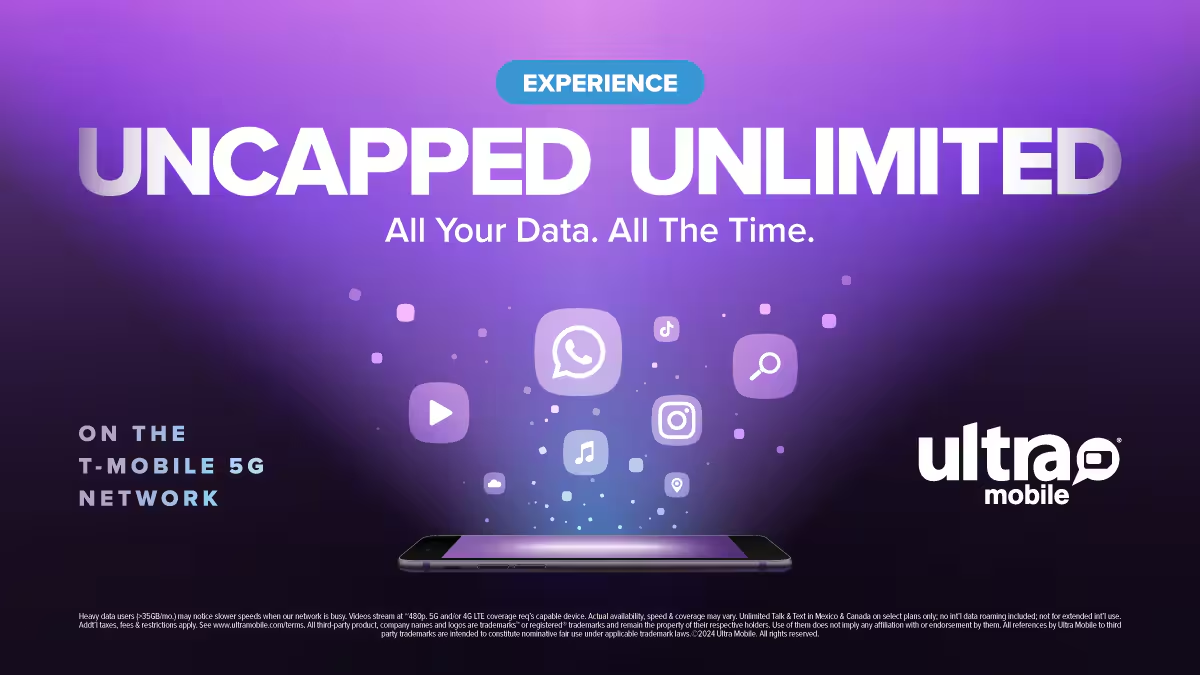Finding the perfect cell phone plan doesn’t have to be complicated. Think of it like finding the ideal pair of shoes—comfortable, reliable, and within your budget. A good plan should fit your daily calling, texting, and data needs without breaking the bank.
In the U.S., the cell phone market is largely dominated by three major providers: AT&T, Verizon, and T-Mobile, which collectively serve over 97% of mobile users. Our recent survey of 1,000 users found that 76% rely on these carriers. Additionally, there are more than 120 mobile virtual network operators (MVNOs) that lease coverage from these giants and offer budget-friendly options.
Most phone plans provide essential features like unlimited calls, texts, and data, but not all plans are created equal. Differences in pricing, network speed, and customer perks can make a big impact on your experience. With so many options available, choosing the right one can feel overwhelming.
We’ve analyzed the top providers to help you find the best cell phone plans for 2025. Whether you’re looking for affordability, premium service, or flexible data options, this list will guide you to the perfect choice.
Top 10 Best Cell Phone Plans of 2025
- Mint Mobile - Affordable wireless freedom with premium nationwide coverage
- Visible - Wireless that gets better with friends
- Xfinity Mobile - Fast, high-priority mobile speeds to keep you connected
- Verizon Wireless - Stay connected at home and abroad
- PureTalk - America’s most dependable 5G Network
- Ultra Mobile - Love knows no barriers, and neither do our plans
- Boost Mobile - Boost Mobile. The Power of Connection
- US Mobile - America's first ever Super Carrier
- AT&T - Connectivity you depend on. Deals you want. Service you deserve
- Consumer Cellular - Freedom Calls

Mint Mobile – A leading provider with flexible plans and nationwide coverage
No long-term contracts required
Free calls to Mexico and Canada
4G LTE and 5G network access
Complimentary mobile hotspot included

Visible – Easy-to-use and affordable wireless service on Verizon's network
$25 per mo for 24 months
Unlimited data with no hidden fees
Enjoy 5G and LTE coverage

Xfinity Mobile – Nationwide coverage designed exclusively for Xfinity Internet customers
5G and LTE coverage nationwide
Two unlimited lines at $30 per line
Get one device free with purchase

Verizon Wireless - High-speed internet, dependable service, and plans for all budgets
Nationwide 5G coverage
Unlimited for $30 per month
Bring your phone, get a $500 gift card

PureTalk – Affordable, no-contract wireless service covering 99% of the U.S. population
Get 60% off your first month
Reliable 4G LTE network coverage

Ultra Mobile – Affordable plans with unlimited international calling on T-Mobile's network
Flexible data plans
Largest 5G network coverage

Boost Mobile – Affordable, no-contract mobile plans
Expanded 5G network
Exclusive member rewards
$10/month for unlimited talk & text

US Mobile – Affordable, customizable, and contract-free cell phone plans
Unlimited plans from $20/month
All plans include 4G LTE and 5G
Keep your number, enjoy 100 days free

AT&T – Nationwide reliable coverage with plans to fit every budget
5G coverage with free mobile hotspot
Unlimited plans starting at $25/month
Free SIM or eSIM when you bring your device

Consumer Cellular – Affordable and flexible mobile coverage across the nation
100% money-back guarantee
Try risk-free with no commitment
Our Methodology: How We Reviewed the Best Cell Phone Plans
Led by tech expert Peter Parker, our approach to reviewing over 60 cell phone plans was simple: provide you with clear, useful insights to help you choose the right provider. Here’s how we did it:
Hands-On Testing: We don’t just read about these plans—we use them. Our team personally explores plan features, tests network coverage, and interacts with customer service to get a real feel for how they work.
Industry Research: We dive deep into market reports and expert reviews to understand the competition. This helps us identify trends, strengths, and weaknesses across providers.
Customer Feedback: Real opinions matter. We analyze thousands of customer reviews, ratings, and testimonials to learn what users love—and what they don’t.
What We Focus On
When reviewing plans, we carefully consider these key factors:
Pricing: Are you getting the best bang for your buck? We look at plan costs, potential hidden fees, and long-term value.
Plan Variety: Whether you’re a solo user or need a family package, we assess how flexible and customizable the options are.
5G Coverage: We evaluate how widespread and reliable the 5G network is to ensure you stay connected with fast speeds.
Network Performance: Beyond coverage, we examine call quality, data speeds, and how well the network handles busy times.
Customer Support: We check how easy it is to get help, whether through phone, chat, or online resources.
Extra Perks: Streaming bundles, discounts, and exclusive deals—what additional value does a plan bring?
With our detailed research, you can confidently choose a cell phone plan that meets your needs without the hassle of sorting through endless options.
Detailed Reviews for Top 10 Mobile Phone Plans


Mint Mobile offers affordable, contract-free mobile plans with nationwide 4G LTE and 5G coverage. It provides flexible plan options, free calling to Mexico and Canada, and features like mobile hotspot access, all managed conveniently through their easy-to-use app.
Pros
Nationwide 4G LTE and 5G coverage
No contracts or long-term commitments
Affordable plans with competitive pricing
Cons
Limited in-store support, primarily online service
Data speeds may slow during network congestion
Requires full payment upfront for multi-month plans


Visible offers affordable and hassle-free wireless service with unlimited talk, text, and data, all powered by Verizon’s reliable 5G and LTE network. With no contracts, hidden fees, or physical stores, Visible provides a fully digital experience, allowing users to manage their plans through a simple mobile app.
Pros
Affordable pricing with no hidden fees
Unlimited talk, text, and data on Verizon’s network
Easy plan management through a user-friendly app
Cons
Limited customer support options (online only)
Data speeds may be deprioritized during network congestion


Xfinity Mobile offers reliable nationwide coverage with access to 5G and LTE networks, exclusively for Xfinity Internet customers. It provides flexible plans, including unlimited and pay-as-you-go options, with the added benefit of bundling services for cost savings. Users can manage their accounts easily through the Xfinity Mobile app, ensuring a seamless and convenient experience.
Pros
Flexible unlimited and by-the-gig plans
Reliable 5G and LTE coverage nationwide
Special discounts for Xfinity Internet users
Cons
Limited in-store support options
Only for Xfinity Internet customers
Speeds may slow during peak times


Verizon Wireless offers nationwide coverage with reliable 5G and LTE connectivity, providing a variety of plans to suit different needs. It features unlimited talk, text, and data options, along with perks like mobile hotspot access and international coverage. Verizon is known for its strong network performance, making it a top choice for seamless communication and entertainment.
Pros
Reliable 5G and LTE coverage
Flexible plans with unlimited options
Perks like hotspot and international use
Cons
Some plans have data limits
Speeds may slow during busy times


PureTalk offers affordable, contract-free wireless plans with nationwide 4G LTE coverage, reaching 99% of Americans. It provides flexible plans, reliable service, and no hidden fees, making it a budget-friendly option for individuals and families.
Pros
Affordable, contract-free plans
Coverage for 99% of the U.S. population
Cons
No unlimited data option
Limited high-speed data on some plans


Ultra Mobile offers flexible and budget-friendly mobile plans with unlimited international calling to over 80 countries. Powered by T-Mobile’s nationwide network, it provides reliable 5G and LTE coverage, no-contract options, and features like mobile hotspot and multi-month savings for individuals and families.
Pros
Affordable, no-contract plans
Unlimited calls to 80+ countries
Reliable 5G coverage with T-Mobile
Cons
Limited data on basic plans
Fewer features than major carriers


Boost Mobile offers budget-friendly, no-contract cell phone plans with unlimited talk, text, and data options. Powered by an expanded 5G network, it provides nationwide coverage, flexible plans, and exclusive perks for members, making it a great choice for cost-conscious users.
Pros
Nationwide 5G coverage
Affordable, no-contract plans
Exclusive rewards for members
Cons
Customer service can be inconsistent
Limited phone selection compared to major carriers


US Mobile offers customizable, no-contract cell phone plans with affordable pricing and nationwide 4G LTE and 5G coverage. It provides flexible options to fit different needs, including unlimited data plans and perks like free trials and international roaming, making it a great choice for budget-conscious users.
Pros
Perks like free trials and roaming
Customizable plans with no contracts
Affordable pricing with 4G and 5G coverage
Cons
Limited customer support
Extra fees for some features


AT&T offers reliable nationwide coverage with a variety of affordable plans, including unlimited data options and 5G access. Customers can enjoy perks like free mobile hotspots, flexible pricing, and the option to bring their own device with a free SIM or eSIM.
Pros
Flexible plans to fit different budgets
Nationwide 5G coverage with reliable service
Free SIM or eSIM when bringing your own device
Cons
Additional fees for premium features
Data speeds may slow during peak hours


Consumer Cellular offers affordable and flexible mobile plans with nationwide coverage, catering primarily to seniors and budget-conscious users. It provides no-contract options, reliable 4G LTE and 5G service, and excellent customer support, along with risk-free trials and money-back guarantees.
Pros
Affordable plans with no contracts
Excellent customer service and support
Reliable nationwide 4G LTE and 5G coverage
Cons
Limited data options for heavy users
Slower data speeds during network congestion
Fewer phone choices compared to major carriers
How to Choose the Right Cell Phone Plan
When selecting a cell phone plan, consider the number of people on your account to find the most cost-effective option. Prices can vary significantly between single-line and multi-line plans. Postpaid providers such as Verizon, Xfinity, and AT&T typically charge more for individual users but offer significant discounts for families, making them a budget-friendly choice for multiple lines.
If you are among the 63% of consumers willing to switch providers for bundled perks like streaming services, prioritize plans offering unlimited high-speed data at an affordable rate, such as Visible+. For those who work remotely or travel frequently, choosing plans with generous hotspot allowances—like high-tier subscriptions from PureTalk or Cricket Wireless—can be beneficial.
Types of Cell Phone Plans
Understanding the available types of cell phone plans can help you choose the best one for your needs.
Unlimited Plans: These provide unlimited talk, text, and data. However, providers may impose data caps on 4G/5G speeds, slowing them down to 2G once limits are reached.
Talk and Text Plans: Ideal for those who only need calling and texting features without internet access.
Data-Only Plans: Designed for tablets and smart devices, these plans exclude talk and text services.
Pay-As-You-Go Plans: Users purchase credits upfront (e.g., $20), which are deducted as they use services, offering flexibility and cost control.
Cell Phone Plan Costs
The cost of cell phone plans varies based on the provider, plan type, and included features. Plans start at approximately $5/month for a single line, with discounts available for additional lines. While most plans include unlimited talk and text, data and hotspot usage significantly impact pricing.
Basic unlimited plans start at around $30/month for a single line, with the average cost closer to $50/month. Multi-line plans with shared data can further reduce monthly expenses.
How Much Data Do You Need?
Estimating data needs depends on the number of users and their online habits. Activities such as streaming, video calls, and gaming consume substantial data when not connected to WiFi. Exceeding data limits on postpaid plans may result in extra fees or throttling. If most usage occurs over WiFi, limited or pooled data plans can save costs. However, heavy users should consider unlimited plans for uninterrupted connectivity.
Postpaid vs. Prepaid vs. Resold Plans
Postpaid Plans:
Postpaid plans require a contract, usually lasting two years, with payments made at the end of each billing cycle. Major carriers like T-Mobile, Verizon, and AT&T offer these plans, which are ideal for families and those who value premium perks, multi-line discounts, and reliable speeds.
Prepaid Plans:
Prepaid plans allow users to pay in advance for their service and are typically cheaper than postpaid options. Providers such as Xfinity, which use major carrier networks, offer these plans. However, prepaid users may experience deprioritization during network congestion. These plans suit individuals who want cost-effective, no-commitment options.
Resold Plans:
Resold plans involve purchasing an existing contract from another user, often at a discounted rate. This option can provide savings if the original subscriber needs to exit their contract due to relocation or other factors. However, it's important to verify plan terms before purchasing.
How to Save Money on Your Cell Phone Plan
Regardless of the plan type, there are several strategies to cut costs:
Regularly review your usage: Assess your plan to identify areas for downgrades or adjustments.
Switch providers: Many carriers offer incentives like free months or bill credits for new customers.
Look for discounts: Teachers, military personnel, and other professionals may qualify for special rates.
Use WiFi whenever possible: Reducing mobile data usage can help minimize costs.
Eliminate unnecessary features: Disable extras such as cloud storage or visual voicemail to avoid additional charges.
Pay bills on time: Timely payments prevent late fees and potential service interruptions.
MVNOs vs. Main Carriers: Key Differences
The primary distinction between Mobile Virtual Network Operators (MVNOs) and main carriers lies in network ownership. Main carriers, such as Verizon and AT&T, own their networks, offering extensive coverage at higher prices. MVNOs, like Boost Mobile and Mint Mobile, lease access from these major carriers, providing more affordable alternatives with potential speed limitations during peak times.
Make an Informed Choice
With the average American checking their phone 144 times daily, selecting the right plan is crucial. Each provider offers a unique blend of coverage, features, and pricing. By evaluating options based on your communication needs, you can stay connected without overspending. Choose wisely and enjoy seamless connectivity with the best cell phone plans available today.


